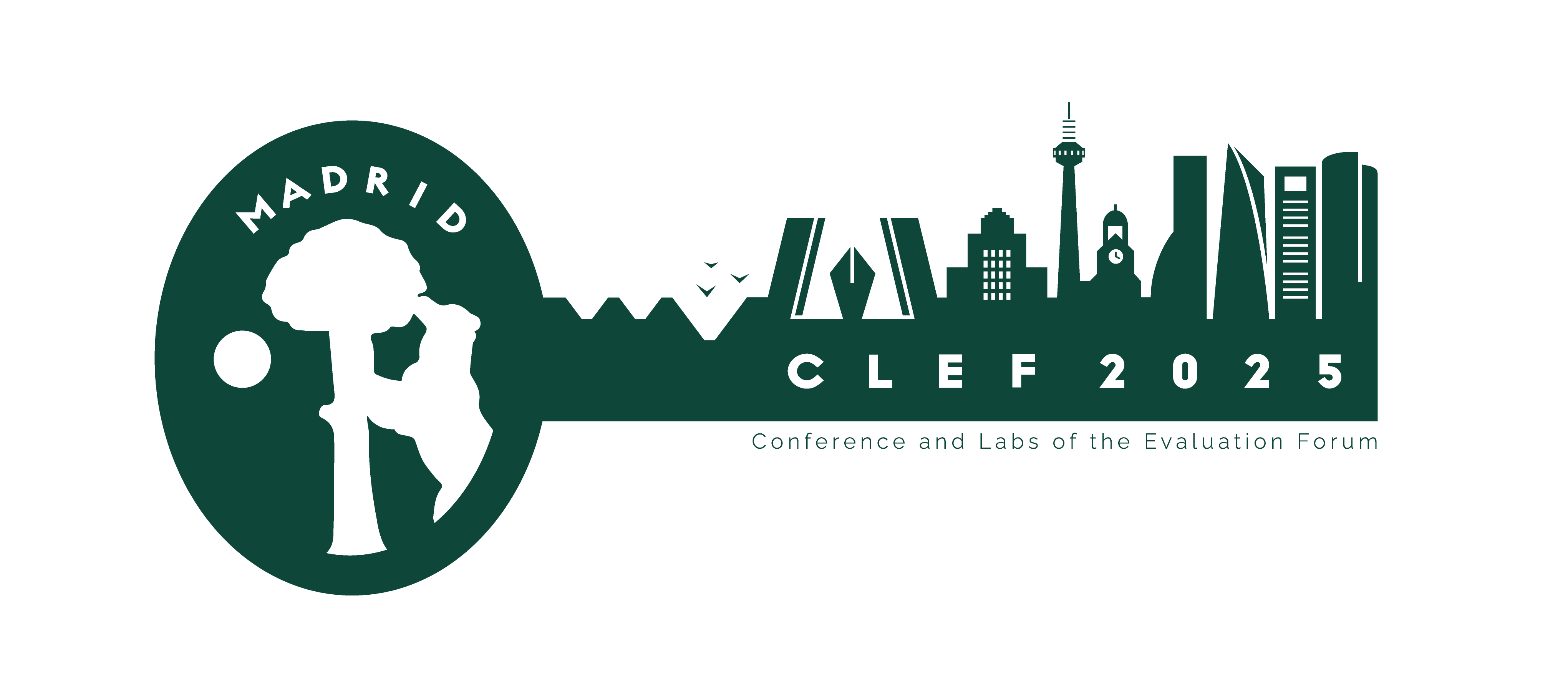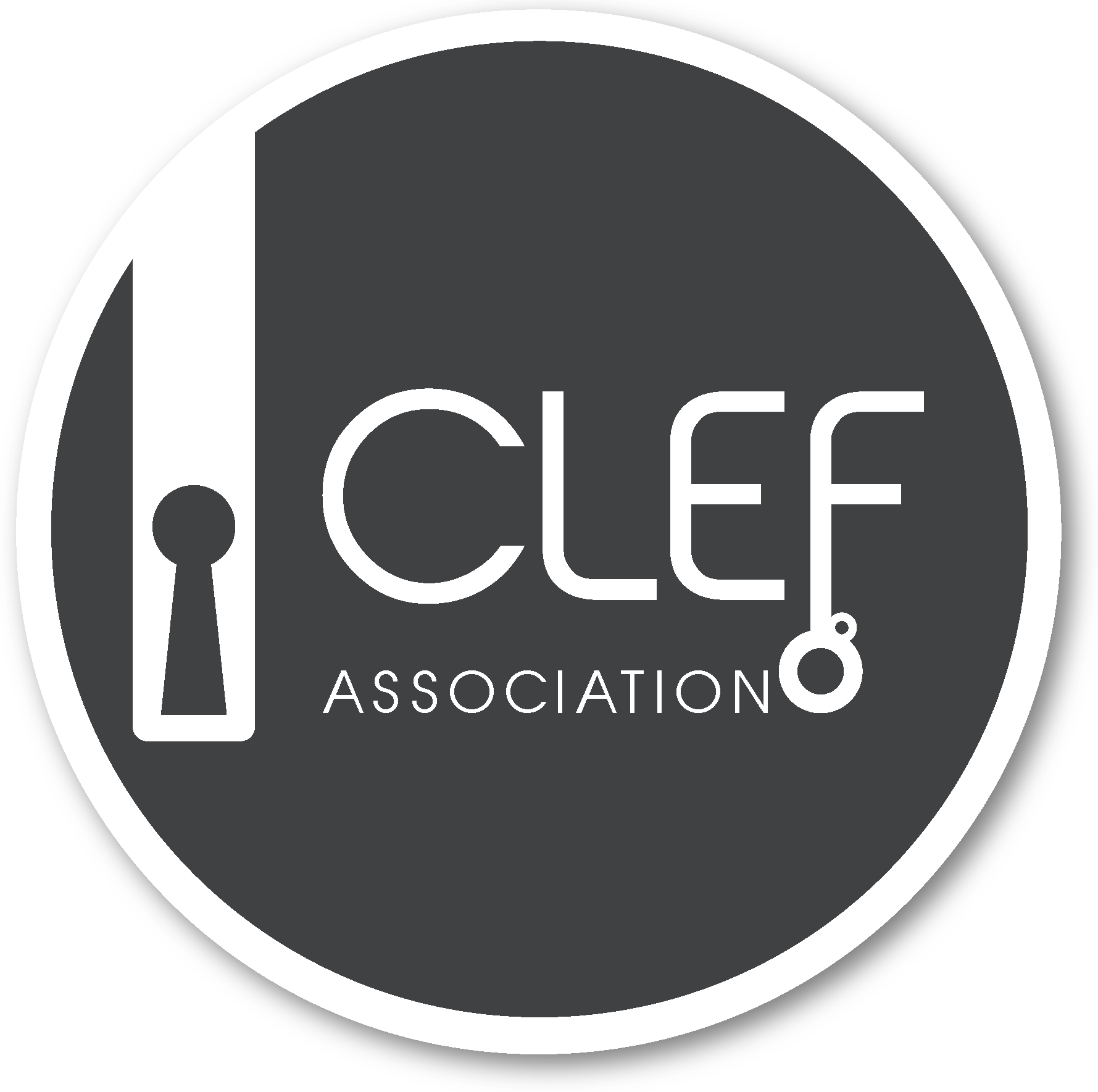| Wednesday, September 10 |
| 11:30-13:15 |
CLEF Session: Lab Overviews (PAN, EXIST, SimpleText, QuantumCLEF) – Salón de Actos |
|
|
|
| 14:15-15:45 |
Keynote and Lab Session, Chair: Martin Potthast – Salón de Actos |
| 14:15-14:45 |
Keynote: Cultural factors in language use and generative AI
Jussi Karlgren
|
| 14:45-15:15 |
Overview: Multi-Author Writing Style Analysis at PAN 2025
Eva Zangerle, Maximilian Mayerl, Martin Potthast and Benno Stein
|
| 15:15-15:30 |
Style Change Detection Using Graph and Structural Linguistic Features for Multi-Author Writing Analysis
Ioana-Roxana Boriceanu and Andra-Elena Băltoiu
|
| 15:30-15:45 |
Team "better_call_claude": Style Change Detection using a Sequential Sentence Pair Classifier
Gleb Schmidt, Johannes Römisch, Mariia Halchynska, Svetlana Gorovaia and Ivan Yamshchikovgit
|
|
|
| 15:45-16:30 |
Coffee Break and Poster Session – Canteen and Ground Floor |
|
|
| 16:30-18:00 |
Lab Session, Chair: Janek Bevendorff – Salón de Actos |
| 16:30-16:45 |
Overview: Generative Plagiarism Detection
André Greiner-Petter, Maik Fröbe, Jan Philip Wahle, Terry Ruas, Bela Gipp, Akiko Aizawa and Martin Potthast
|
| 16:45-17:15 |
Overview: Multilingual Text Detoxification at PAN 2025
Daryna Dementieva, Vitaly Protasov, Nikolay Babakov, Naquee Rizwan, Ilseyar Alimova, Caroline Brune, Vasily Konovalov, Arianna Muti,
Chaya Liebeskind, Marina Litvak, Debora Nozza, Shehryaar Shah Khan, Sotaro Takeshita, Natalia Vanetik, Abinew Ali Ayele, Frolian Schneider,
Xintog Wang, Seid Muhie Yimam, Ashraf Elnagar, Animesh Mukherjee and Alexander Panchenko
|
| 17:15-17:30 |
nikita.sushko at TextDetox CLEF 2025: Exploring A Sage-T5-like Approach For Text Detoxification
Alexandr Voronin, Daniil Moskovsky and Nikita Sushko
|
| 17:30-17:45 |
SVATS at PAN 2025 TextDetox: Can Small Models Outperform Large Ones in Text Detoxification?
Vladislav Kozlovskiy, Alexander Ploskin, Sameer Tantry, Tatyana Matveeva and Sofya Savelyeva
|
|
|
| Thursday, September 11 |
| 14:15-15:45 |
Lab Session, Chair: Benno Stein – Salón de Actos |
| 14:15-14:35 |
Overview: “Voight-Kampff” Generative AI Authorship Verification at PAN and ELOQUENT 2025 (Subtask 1)
Janek Bevendorff, Jussi Karlgren, Matti Wiegmann, Maik Fröbe, Efstathios Stamatatos, Martin Potthast and Benno Stein
|
| 14:35-14:45 |
DivEye at PAN 2025: Diversity Boosts AI-Generated Text Detection
Advik Basani and Pin-Yu Chen
|
| 14:45-14:55 |
Team Nexus Interrogators at PAN: Voight-Kampff Generative AI Detection
Samiya Ali Zaidi, Huzaifah Tariq Ahmed, Sarrah Ali Akbar, Ziaullah Shakeel, Faisal Alvi and Abdul Samad
|
| 14:55-15:10 |
mdok of KInIT: Robustly Fine-tuned LLM for Binary and Multiclass AI-Generated Text Detection
Dominik Macko
|
| 15:10-15:25 |
Human or Not? Light-Weight and Interpretable Detection of AI-Generated Text
Maximilian Seeliger, Patrick Styll, Moritz Staudinger and Allan Hanbury
|
| 15:25-15:45 |
Overview: Human-AI Collaborative Text Detection at PAN 2025 (“Voight-Kampff” Subtask 2)
Yuxia Wang, Akim Tsivgun, Jinyan Su, Zhuohan Xie, Mervat Abassy, Jonibek Mansurov, Rui Xing, Minh Ngoc Ta, Kareem Ashraf Elozeiri, Tianle Gu, Raj Vardhan Tomar, Jiahui Geng, Ekaterina Artemova, Artem Shelmanov, Nizar Habash, Iryna Gurevych
|
|
|
|
| 15:45-16:30 |
Coffee Break – Canteen and Ground Floor |
|
|
| 16:30-18:00 |
Lab Session, Chair: Janek Bevendorff – Salón de Actos |
| 16:30-16:40 |
Unibuc - NLP at "Voight-Kampff" Generative AI Detection PAN 2025
Teodor Marchitan, Claudiu Creanga and Liviu P. Dinu
|
| 16:40-16:50 |
DBG: Human-AI Collaborative Text Classification with DeBERTa-enhanced Contextual and Geometric Attention
Tufeng Xian, Yong Zhong, Fen Liu, Meifang Xie, Qiyuan Sun, Miaoji Zheng, Weidong Wu and Zhiliang Zhang
|
| 16:50-17:00 |
Overview: Voight-Kampff at ELOQUENT 2025
Jussi Karlgren
|
| 17:00-17:10 |
The Distinctive Data-Centric Approach for the Voight Kampff Task
Rohit R. Gunti
|
| 17:10-17:20 |
Literal Re-translation as a Method for AI Text Disguise and Detection Evasion
Poojan Vachharajani
|
| 17:20-17:50 |
Overview: The Robustness and Consistency Task of the ELOQUENT 2025 Lab for Evaluating Generative Language Model Quality
Jussi Karlgren, Marie Isabel Engels, Maria Barrett, Rohit Raj Gunti, Mohanna Hoveyda, Bruno Nadalic Sotic, Jaap Kamps, Mika Koistinen, Elaine Zosa
|
| 17:50-18:00 |
Closing
|


